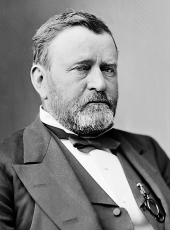To the House of Representatives:
For the reason stated in the accompanying communication, submitted to me by the Secretary of War, I have the honor to return herewith without my approval House bill No. 36, entitled "An act to restore the name of Captain Edward S. Meyer to the active list of the Army."
U. S. GRANT
WAR DEPARTMENT,
Washington, D.C., August 4, 1876 .
The PRESIDENT.
SIR: I have the honor to return House bill No. 36, "to restore the name of Captain Edward S. Meyer to the active list of the Army," and beg to invite your attention to the inclosed report of the Adjutant-General of this date, stating objections to the approval of the bill.
Very respectfully, your obedient servant,
J.D. CAMERON,
Secretary of War.
ADJUTANT-GENERAL'S OFFICE, August 4, 1876 .
Respectfully returned to the Secretary of War.
Edward S. Meyer served as a private in the Fourth Ohio Volunteers (three months) from May 4, 1861, to August 18, 1861. He again enlisted as private, Nineteenth Ohio Volunteers, September 10, 1861; was promoted first lieutenant November 1, 1861, and resigned September 27, 1862. He was commissioned captain, One hundred and seventh Ohio Volunteers, November 11, 1862; was wounded at Chancellorsville, Va., May 2, 1863, and discharged for physical disability January 1, 1865. He was again mustered into service February 8, 1865, as major, Fifth United States Veteran Volunteers (Hancock's Corps), and mustered out March 20, 1866. Was brevetted lieutenant-colonel, colonel, and brigadier-general of volunteers March 13, 1865.
He was appointed captain, Thirty-fifth United States Infantry, July 28, 1866; became unassigned August 12, 1869; assigned to Nineteenth Infantry August 5, 1870, and transferred to Ninth Cavalry January 1, 1871. Retired August 24, 1872.
July 8, 1869 , Captain Meyer applied for retirement on account of wounds received at Chancellorsville May 2, 1863, by which he was incapacitated for active service. No action was then had on the request, pending action by Congress reducing the Army.
October 6, 1869 , he asked to be placed on waiting orders, being unfit for duty, and no possibility of improvement without going North. He was accordingly relieved from duty and ordered home to await orders.
December 18, 1869 , he called on the Secretary of War and asked to be assigned to duty.
January 4, 1870, he again applied to be assigned to duty with some regiment on the frontier, stating that his wound had healed, etc., and asking to withdraw his previous request for retirement. This was accompanied by a similar request from his father, Mr. S. Meyer, of Ohio.
July 29, 1870, he applied the third time to withdraw application for retirement and to be assigned to duty. On January 1, 1871, in accordance with his repeated requests to be assigned to duty, he was assigned to the Ninth Cavalry, serving in Texas. He joined the regiment, and on March 4, 1872, he renewed his former request to be ordered before a retiring board, stating that he found his injuries would not allow him to remain on duty on the frontier; that his disability was constantly increasing, etc. The medical director of the department approved the request, and added that Captain Meyer's wounds certainly unfitted him for service on the frontier.
April 13, 1872, Senator Sherman joined in requesting retirement of Captain Meyer. He was ordered before the retiring board and on August 20, 1872, was examined.
The board found Captain Meyer "incapacitated for active service, and that said incapacity results from a gunshot wound received in his lower jaw at the battle of Chancellorsville, Va., May 2, 1863," when captain in One hundred and seventh Ohio Volunteers. He was retired in accordance with the finding.
March 21 and December 6, 1873, Captain Meyer asked restoration to active service and reappointment as a captain of cavalry, which application was disapproved by the General of the Army.
Pending the action on the bill before Congress no reports were called for as to the official facts of record in the War Department, and no evidence has been filed in this office showing that he has sufficiently recovered.
The absence of such evidence and the fact that after one assignment to active duty he has failed to be sufficiently recovered are submitted as objections why the bill should not be approved.
E.D. TOWNSEND,
Adjutant-General.
Ulysses S. Grant, Veto Message Online by Gerhard Peters and John T. Woolley, The American Presidency Project https://www.presidency.ucsb.edu/node/204721

